Chapter: Mechanical and Electrical : Power Plant Engineering : Coal Based Thermal Power Plants
Belt Conveyor
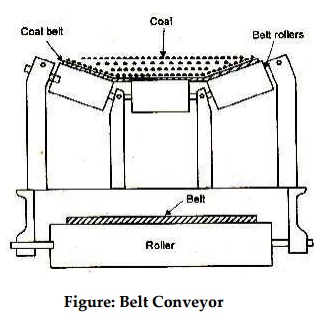
Belt
Conveyor
Figure: Belt Conveyor
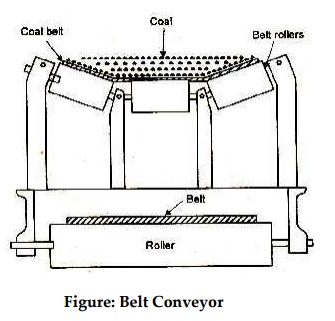
Figure
shows a belt conveyor. It consists of an endless belt moving over a pair of end
drums (rollers). At some distance a supporting roller is provided at the
centre. The belt is made up of rubber or canvas. Belt conveyor is suitable for
the transfer of coal over long distances. It is used in medium and large power
plants. The initial cost of system is not high and power consumption is also
low. The inclination at which coal can be successfully elevated by belt conveyor is about 20°. Average
speed preferred than other types.
Advantages
of belt conveyor
1.
Its
operation is smooth and clean
2.
It
requires less power as compared to other types of systems
3.
Large
quantities of coal can be discharged quickly and continuously.
4.
Material
can be transported on moderate inclines.
2. Screw Conveyor
It consists of an endless helicoid screw fitted to a shaft
(figure). The screw while rotating in a trough transfers the coal from feeding
end to the discharge end.
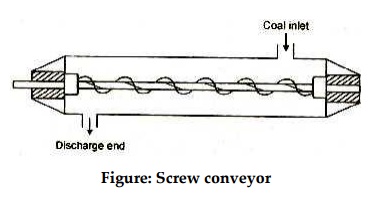
Figure: Screw conveyor
This system is suitable, where coal is to be transferred
over shorter distance and space limitations exist. The initial cost of the
consumption is high and there is considerable wear o screw. Rotation of screw
varies between 75-125 r.p.m
3.
Bucket elevator
It consists of buckets fixed to a chain (figure). The
chain moves over two wheels. The coal is carried by the bucket from bottom and
discharged at the top.
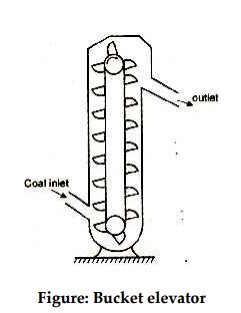
4.
Grab bucket elevator
It lifts and transfers coal on a single rail or track from
one point to the other. The coal lifted by grab buckets is transferred to
overhead bunker or storage. This system requires less power for operation and
requires minimum maintenance.
The grab bucket conveyor can be used with crane or tower as
shown in figure . Although the initial cost of this system is high but
operating cost is less.
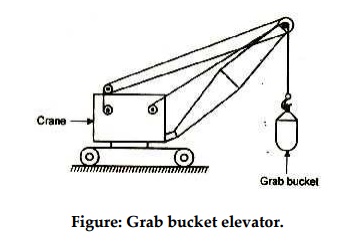
Figure: Grab bucket elevator.
Storage
of Coal
It is desirable that sufficient quantity of coal should be
stored. Storage of coal gives protection against the interruption of coal
supplies when there is delay in transportation of coal or due to strike in coal
mines. Also when the prices are low, the coal can be purchased and stored for
future use. The amount of coal to be stored depends on the availability of
space for storage, transportation facilities, the amount of coal that will
whether away and nearness to coal mines of the power station. Usually coal
required for one month operation of power plant is stored in case of power
stations are situated at longer distance from the collieries whereas coal need
for about 15 days is stored in case of power station situated near to
collieries. Storage of coal for longer periods is not advantageous because it
blocks the capital and results in deterioration of the quality of coal.
Related Topics